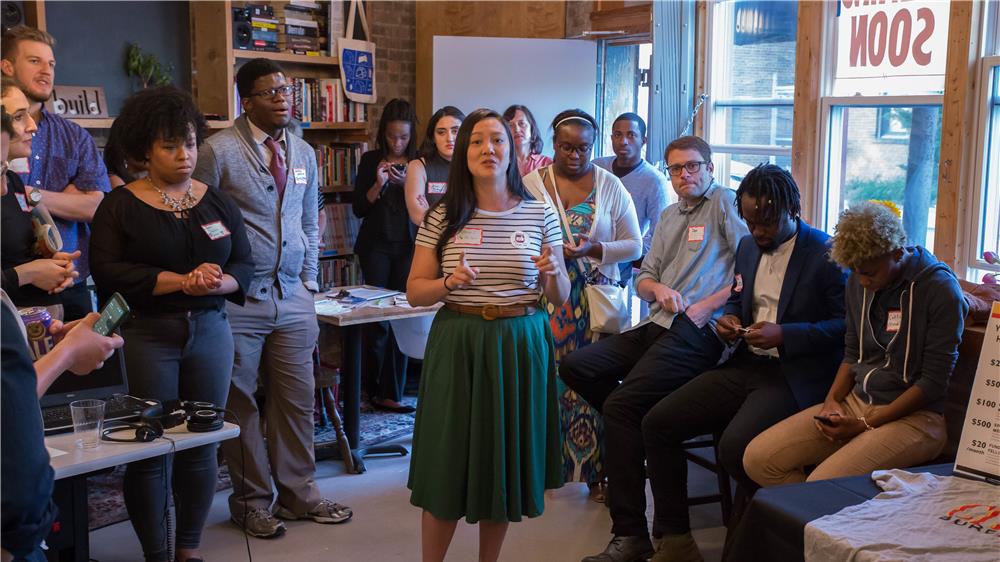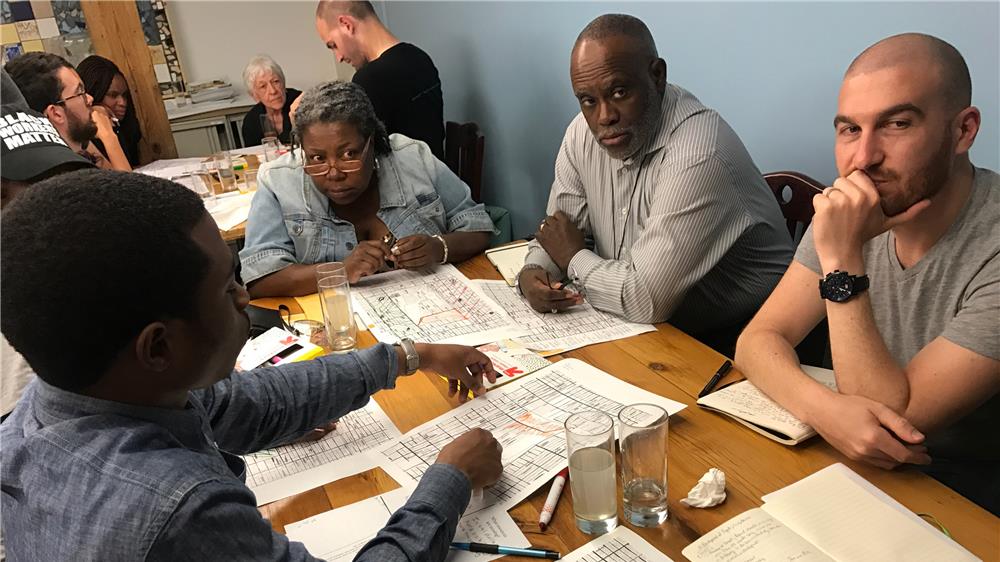ترجم هذا المقال بالتعاون مع نيمان ريبورتس - جامعة هارفارد
في ربيع عام 2015، وبعد ستة أعوام قضيتُها في العمل منتجة ومراسلة، تركت العمل في محطة الإذاعة العامة في ديترويت. كنت بذلك أقفز من بر الوظيفة الآمن إلى عالم العمل الحر المتقلب.. كنت خائفة جدا في الحقيقة، إلا أن ثقل كوني الصحفية الملونة الوحيدة في غرفة الأخبار جعلني أشعر بحالة من الإرهاق الجسدي والنفسي.
خلال عملي مراسلة صحفية، كانت تروق لي زيارة الأحياء التي تقطنها مجتمعات من منابت عرقية مختلفة لكتابة قصص صحفية جيدة.. كنت أجد الكثير منها، وكان يزعجني أنه لا يمكنني الكتابة عنها كلها، لذلك حفظت الكثير مما جمعته عن الأحياء التي يقطنها أميركيون من أصول عربية وهندية ومكسيكية، وكلما احتاج أحد زملائي للحديث مع أحد المصادر في تلك المجتمعات جاءني وطلبه مني.
لم يكن لذلك أثر في نفسي في البداية، بل في الحقيقة كنت فخورة لأني أملك هذه القائمة الطويلة من الأسماء التي يمكنني الرجوع إليها في أي وقت. وذات مرة، حين قررت أخذ إجازة كنت في أمس الحاجة إليها، جاءني المدير العام آنذاك وطلب مني أن أعد قائمة بأسماء مصادر من أميركيين من أصول عربية وأن أرسلها إلى زملائي في الفريق قبل أن أبرح المكان.
لم يتحول ذلك الاستياء المسكوت عنه في داخلي إلى غضب إلا لمّا بدأت العمل الحر، حينها فقط بدأت أدرك أني كنت أُستغلّ بطريقة أو بأخرى، فأنا أزوّد الزملاء بمصادر، أترجم من الإسبانية وإليها، وأفتح الطريق أمام مجتمعات لطالما استُثنِيَت من عالم الراديو العام.. لماذا كنت أنا الوحيدة التي يتوجب عليها إعداد مصادر الاتصال هذه؟
أردت أن أعرف هل كانت هذه تجربتي أنا وحدي أم أن هناك آخرين مثلي يشعرون بأنهم يقومون بأكثر مما عليهم القيام به في وظائفهم التي لا تحدد لهم فيها المهام المطلوبة منهم أصلا. طرحت هذا السؤال على صحفيين ينتمون لجماعات عرقية مختلفة يعملون في الولايات المتحدة، وفعلت ذلك عبر رسالة على مجموعة مغلقة على الفيسبوك.. كان الجواب صاعقًا،وكان ذلك كافيا ليجعلني أرغب في الكتابة عن المسألة.
علق العديد من الصحفيين على سؤالي الذي طرحته في الفيسبوك، كما تكلمت بشكل مباشر مع كثيرين غيرهم من الصحفيين والصحفيات وأخبروني عن تجاربهم.. بيتينا تشانغ كانت واحدة منهم.

وانطلاقًا من طبيعة عملها كمحررة رقمية تنفيذية في إحدى المجلات، تحدثت تشانغ عن استيائها من عملها كأنها مسؤولة -بشكل غير رسمي- عن البحث عن كتّاب مقالات رأي رئيسية،وقالت: "أتذكر أسئلة سخيفة كانت توجه إلي، مثل: هل تعرفين كاتبة سوداء يفوق عمرها الستين يمكنها كتابة مقال رأي طويل؟".
لقد كانت تشانغ حريصة على التنوع في قائمة كتّاب المجلة، وكانت غالبًا تتنازل وتساعد في العثور على ما يبحث عنه زملاؤها، لكن ما كان يسبب لها الامتعاض هو أن بقية المحررين لم يكونوا يبذلون أي جهد في بناء قائمة بالكتاب من خلفيات وهويات شتى.
تجاوزت الضغوطات على تشانغ قضية البحث عن الكتّاب، وتقول: "كأنها مسؤوليتي أنا، إذا ما كان الموضوع يخص القضايا المتعلقة بالأشخاص من أصول لاتينية أو أفريقية، لا سيما إذا كان الأمر يتعلق بقضايا الهجرة أو حوادث إطلاق النار، سواء كانت تمسّهم بشكل شخصي أو لا".
ومثلي تماما، تركت تشانغ العمل في الإعلام التقليدي، فبعد سنوات من العمل في المجلات سئمتْ من الشعور بأنها "ناطور" يلجأ إليه بقية المراسلين كلما احتاجوا إلى مصدر. كانت تشانغ على يقين بأن هناك طريقة أفضل للعمل، لذا عزمت هي وثلاثة من زملائها على تأسيس غرفة الأخبار المثالية في نظرهم.
انطلقت مؤسسة "سيتي بيرو" (City Bureau) عام 2015 وفق رؤية تنص على ما يلي: "الجمع بين الصحفيين وأفراد المجتمع من أجل تغطية إعلامية عادلة ومساءلة السلطات وذوي النفوذ". بالنسبة لتشانغ -الشريكة المؤسِّسة ومديرة التحرير في المؤسسة- كان ذلك يعني واقعا مغايرا، فبدل أن يتحمل صحفي واحد أو اثنان عبء البحث عن المصادر في المجتمعات الملونة أو في مجتمعات المهاجرين، صار ذلك أمرا يشترك في مسؤوليته جميع الزملاء.
يمضي الصحفيون في "سيتي بيرو" أسابيع في العمل على كتابة قصة واحدة، إذ يُرسلون إلى المجتمعات المختلفة لتكوين العلاقات وتقوية روابط الاتصال مع أفراد لهم نشاطات في تلك الأحياء. تقول تشانغ: "يدرك الصحفيون عندما يدخلون إلى غرفة الأخبار أن مهمتهم هي فهم السياق الكامل للقصة التي يبحثون فيها"، وتتابع: "حتى لو كان ذلك يعني عقد عشرة اجتماعات دون كتابة كلمة واحدة".
لا تعتقد تشانغ ولا زملاؤها أن على الصحفي العيش في المجتمع الذي يكتب عنه، ولكنها تؤمن بأن عليه أن يكون على دراية وافية بأحوال الناس الذين يعيشون فيه. فالهدف في نظرها هو العملية ذاتها، لا المنتجُ النهائي بالضرورة. هذا المنهج يتيح للصحفيين الدخول وفهم التاريخ الخاص بذلك المجتمع ليتعرفوا على القوى الفاعلة فيه، وليفهموا طبيعة تعاطي السلطات مع أفراده والعلاقات التي تحكم الناس فيه.
وتضيف تشانغ: "بعبارة أخرى، إن لم يسبق لك الذهاب إلى مجتمع ما لتقدم له شيئًا، فمن الأفضل ألا تكتب عنه".
خلال سنوات عملي في محطة الراديو، كنت أتصل بمشرفي جون رودلف -المحرر التنفيذي في مؤسسة"فيت إن تو وورلدز" (Feet in 2 Worlds)- للحصول على نصيحته حول كيفية الوصول إلى غرف الأخبار التي تتألف من أشخاص بيض بشكل حصري. أدرك رودلف منذ وقت طويل أنه لا يتم تقدير القدرات المتعلقة بالتواصل الثقافي كما يلزم. فكما يقول، ما زال المحررون لا يدركون أن التحدث بلغة ثانية، والقدرة على الولوج في مجتمعات المهاجرين وفهمهم والتحدث إليهم، هي مهارات خاصة لا يستهان بها. ويضيف: "لعقود طوال تحدثت المؤسسات الإخبارية عن أهمية الاختلاف، إلا أنها حتى الآن لم تستطع الوصول إلى طريقة تمكن من الاستفادة منه".
تقدّم مؤسسة "فيت إن تو وورلدز" برنامجا تدريبيا مرموقا للمراسلين المهاجرين في نيويورك. وفي كل عام، تختار أربعة مراسلين للمشاركة في البرنامج (وقد شاركت فيه عام 2008)، إذ يعملون مع مشرف يساعدهم على تطوير مهاراتهم الإذاعية، ويوفر لهم مساحة تتيح لهم تعلم أشياء جديدة، وارتكاب الأخطاء دون أن يتم الحكم عليهم.
تخرَّج عدد كبير من المراسلين من برنامج التدريب هذا منذ تأسيسه وحققوا نجاحات باهرة، ولكن رودلف يقول إن أربعة مراسلين في العام الواحد عدد غير كاف. ويواصل: لا بد من تكوين نظام إشراف للصحفيين من المهاجرين يساعدهم على الانخراط في غرف الأخبار، وهي بيئات فيها الكثير من التنازع والصدام بطبيعة الحال. لا بد أن تكون هناك هيكلية معينة لمساندة الأشخاص الذين استُثنوا تقليديا من هذه الأماكن.
إن الرسالة التي يحملها برنامج "فيت إن تو وورلدز"هي شيء أؤمن به حقا، ولذلك بدأت في منتصف العام 2017 العمل مع المؤسسة لإطلاق البرنامج في ولايات أخرى. وفي هذا الخريف ستفتتح المؤسسة بالتعاون مع إذاعة "دبليو ديت" (WDET) أول مكتب في ديترويت، حيث سيدرِّب أربعة صحفيين مخضرمين من المهاجرين أربعة صحفيين من أصول عرقية مختلفة، والهدف من ذلك إيجاد مجموعات من الصحفيين الأكفاء للعمل في وسائل الإعلام المكتوب والمسموع في ديترويت.
على مدى القرن الماضي، خضعت إدارة المؤسسات الإعلامية "لمقياس موحد" وضعه رجال بيض. يمكن القول بأن المهنة تطورت نوعا ما، لكن ثقافة غرفة الأخبار لا تزال على ما هي عليه، وما هذا الكفاح من أجل نقل القصصعن المجتمعات الملونةإلا أثر من ذلك النموذج القديم.
أما بالنسبة لبارب أنغويانو -وهي مراسلة في وسط غرب الولايات المتحدة- فإن مصدر الإحباط الذي تعيشه هو أنه دائما ما تُستبعد عن إعداد القصص الصحفية المتعلقة بقضايا ذوي الأصول اللاتينية. تقول بارب "يقولون إنه لا أحد يستمع إلى الإذاعة في مجتمع من أصول لاتينية، لكنهم لا يعلمون أن الطريقة الوحيدة للحصول على المستمعين هو أن تمنحهم صوتًا". وتضيف: "مَن بربّك تعتقدين أنه أقدرُ على فهم هذا المجتمع من ابنة مهاجرين مثلي؟". لقد أحست بارب بأن أفكارها لا تلقى ترحيبا أبدا، مما جعلها تسأل نفسها لماذا اختارت العمل في محطة إذاعة عامّة من الأساس. أما الآن فبدلا من انتظار التطور على سلم الوظيفة، فإن بارب تفكر في ترك غرفة الأخبار.. "لا أشعر بأني أقدم أقصى ما أستطيع.. أشعر بأن لدي شيئا مهما يسعني تقديمه، وأن عزيمتي هذه قد تذوي هنا.. أتساءل: هل العمل الصحفي الحر إلى جانب وظيفة في متجر ما هو الحل الأفضل؟".
جميع من تكلمت معهم من الصحفيين تقريبا، إما قد تركوا مؤسساتهم الإعلامية أو أنهم يخططون لذلك. إن عدم تواجد الصحفيين الملونين في غرف الأخبار أمر خطير، ليس لأن عددهم قد يقل واحدا، بل للخسارة التي يحدثها ذلك في تطبيقنا للديمقراطية التمثيلية.
تقول المذيعة الزائرةفي الإذاعة الوطنية العامة "أن.بي.آر" (NPR)ومؤلفة كتاب بعنوان "العقلية المسموعة" (HeardMentality) سيليست هيدلي:رأيت ذلك يحصل بأم عيني.. تضمّ صحفيا ملونا إلى الفريق، وفي الأسابيع الأولى للعمل يشرع بطرح أفكار جديدة ومثيرة، ولكن البقية ممن "قرؤوا على شيخ واحد" ويتشاركون الأولويات ذاتها ويحملون الأفكار نفسها حول ما هو صواب وضروري، يجدون أن أفكار هذا الصحفي الجديد سخيفة وغير جديرة بالاهتمام، بل ويجعلونها محلّ استهزاء في بعض الأحيان.
تقول هيدلي إن الكارثة التي تحصل عندما يترك أمثال أنغويانو غرف الأخبار، تكمن في استمرار التفكير الجماعي النمطي الذي يحدث نتيجة توظيف أفراد تلقوا التعليم ذاته، وينتمون إلى خلفية اجتماعية واحدة، ويبدؤون تلقائيا بتكريس نفس الأفكار والقصص.
وخلال مهنتها كمقدمة للبرامج الإذاعية، عملت هيدلي في شبكة "أن.بي.آر" (NPR) وفي العديد من المؤسسات الإعلامية المحلية والوطنية العريقة، وكمقدمة سابقة لبرنامج "أون سكاند ثاوت" (On Second Thought) الذي كان يذاع على أثير راديو ولاية جورجيا، صممت على أن تدير هي بنفسها طريقة سير برنامجها، حيث أرادت خلق بيئة معاكسة لما يسمى التفكير الجماعي النمطي.. بيئة تشجع العاملين على الاختلاف والنقاش والخروج بأفكار جديدة.

واحدة من تلك الأفكار كانت تغطية أخبار موسيقى الهيب هوب والفانك على أنها فنّ رفيع، تمامًا كما يُنظر إلى أوركسترا أتلانتا.. تقول هيدلي: "كنا أول برنامج إذاعي يخصص فقرة كاملة عن مغني الراب من أصول أفريقية جوتشي ماني".
قد لا يبدو الأمر على قدر كبير من الأهمية، ولكن إذا نجح ذلك في تغيير سلوك الناس تجاه الأميركيين الشباب من أصول أفريقية الذين يعزفون الهيب هوب الصاخب، وأن يبدؤوا باعتبار ذلك فنا موسيقيا آخر لأنهم سمعوه على الراديو، فإن الفكرة قد تستحق كل ذلك العناء.
نقوم -نحن البشر- بالأعمال الموكلة إلينا على أكمل وجه حين نحاط بالاختلاف الفكري، ولكن في محاولة التوصل إلى إجماع واتفاق دائميْن، نقتل تفكيرنا الخلاق والإبداعي.إن الإصرار على أهمية الاختلاف يتجاوز التحلّي باللطف وحسب مع من تختلف معهم، فهذه ليست قضية أخلاقية.. السبب الحقيقي الذي يجعلنا بحاجة إلى الاختلاف هو أنه يجعلنا جميعا أشخاصا أفضل.








































